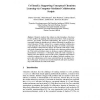Free Online Productivity Tools
i2Speak
i2Symbol
i2OCR
iTex2Img
iWeb2Print
iWeb2Shot
i2Type
iPdf2Split
iPdf2Merge
i2Bopomofo
i2Arabic
i2Style
i2Image
i2PDF
iLatex2Rtf
Sci2ools
97
Voted
ECTEL
2008
Springer
2008
Springer
CoChemEx: Supporting Conceptual Chemistry Learning Via Computer-Mediated Collaboration Scripts
Chemistry students, like students in other disciplines, often learn to solve problems by applying well-practiced procedures. Such an approach, however, may hinder conceptual understanding. We propose to promote conceptual learning by having pairs of students collaborate on problems in a virtual laboratory (VLab), assisted by a computer-mediated collaboration script that guides the students through the stages of scientific experimentation and adapts to their needs for support. We used the results from a smallscale study comparing how singles and dyads solve chemistry problems with the VLab with and without scripts to develop a scripted collaborative experimentation environment. A subsequent small-scale study compared an adaptive and a non-adaptive version of the system. Qualitative data analyses revealed a tendency for the dyads in the adaptive feedback condition to improve their collaboration and be more motivated than the non-adaptive dyads. In this paper, we present our research fram...
Computer-mediated Collaboration Script | Dyads Solve Chemistry | ECTEL 2008 | Machine Learning | Subsequent Small-scale Study |
| Added | 19 Oct 2010 |
| Updated | 19 Oct 2010 |
| Type | Conference |
| Year | 2008 |
| Where | ECTEL |
| Authors | Dimitra Tsovaltzi, Nikol Rummel, Niels Pinkwart, Andreas Harrer, Oliver Scheuer, Isabel Braun, Bruce M. McLaren |
Comments (0)

